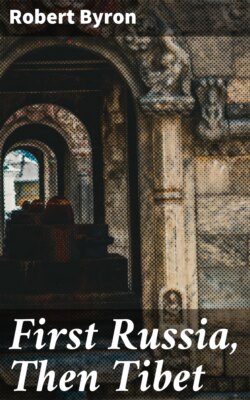Читать книгу First Russia, Then Tibet - Robert Byron - Страница 4
На сайте Литреса книга снята с продажи.
THE TRAVELLER’S CONFESSION
ОглавлениеTable of Contents
It has been the boast of some travel-books to contain nothing that can either instruct or improve their readers. The boast is one I should like to make; for a book that entertains by its art alone will always be more welcome than one that forces attention upon its learning or righteousness. Of these qualities, it is true, the following pages are innocent enough. But the motives that prompted the journeys they describe were not so innocent. I have travelled, I must confess, in search of both instruction and improvement. As member of a community, and heir to a culture, whose joint worth is now in dispute, I would discover what ideas, if those of the West be inadequate, can with greater advantage be found to guide the world. And to this end I would also know, in the language of my own senses, in whom and what the world consists. These vast considerations, let me hasten to add, find small place in the present volume. But they are responsible for its general attitude, since it is only from the sum of isolated journeys that even the shadow of an answer to them can ever be expected.
A conception of the whole world in terms of personal knowledge is held by contemporary opinion to be not only impossible as an attainment, but contemptible as a goal. Real knowledge, according to this view, is the prerogative of the specialist, and is contained, as it were, in cells to which he alone has access. A specialist has been defined as ‘one who grows to know more and more about less and less’; as the cells multiply, the scope of each diminishes and the truth contained in it shrinks correspondingly. To suggest that real knowledge must come from a study not of this or that particular cell, but of the relatioship between them all, is to invite ridicule and hostility. For the bureaucracy of the mind, like that of the State, is jealous of those who would scrutinize the harmony of its departments. Yet for some persons there exists an organic harmony between all matter and all activity, whose discovery is the purpose of their lives and whose evidence, being inexhaustible, can only be selected by the good judgement and perpetual curiosity of the individual. From this process derives that most invaluable of human resources, an absolute standard of worth capable of unlimited extension.
These persons are the travelling species. The pleasures of travel need no reiteration. But when the impulse is so imperious that it amounts to a spiritual necessity, then travel must rank with the more serious forms of endeavour. Admittedly there are other ways of making the world’s acquaintance. But the traveller is a slave to his senses; his grasp of a fact can only be complete when reinforced by sensory evidence; he can know the world, in fact, only when he sees, hears, and smells it. Hence that craving for personal reconnaissance which can only be lulled by acquaintance with the broad compartments of race, politics, and geography that comprise our earth. From the specialist’s point of view such acquaintance must always be superficial. The traveller can only reply that at least he desires to know more and more about more and more.
This book presents two excursions whose very diversity is symbolic of those formidable contradictions which make it a privilege and a puzzle to be alive in the twentieth century. The first part is concerned with Russia, where the moral influence of the Industrial Revolution has found its grim apotheosis; the second with Tibet, the only country on earth where that influence is yet unknown, where even the cart is forbidden to traverse plains flatter than Daytona Beach, and the Dalai Lama himself rides in a man-borne palanquin. Prior to the Industrial Revolution each country had evolved a unique tradition of civilization. In Russia the tradition has succumbed completely to the virus of the machine. In Tibet it has remained as completely immune from it. Among nations which enjoy such traditions, the two countries represent the extremes of political, social, and mental difference from the accepted mean. These extremes are confirmed even by their appearance. Russia is lower and more colourless, Tibet higher and more coloured, than any country on earth. Such confirmation is more than a coincidence. It is an explanation.
Extremes of this kind must provoke different reactions in the same traveller. The ideas of Russia are preached, and act, as a challenge to those of the West. The ideas of Tibet offer no challenge; they maintain, simply, a passive resistance towards those of the West. Thus in Russia one must think, argue, and defend. In Tibet one need only observe and sympathize. Russia, moreover, presents a sort of caricature of the West; art, politics, and thought alike have derived from Europe and can only be understood in terms of their European ancestry. Tibet has no relation to the West whatsoever; the historical faculty becomes superfluous; observation consists in the assimilation of pure novelty. These differences are reflected in the form of my book. The contrast between its two parts is more than one of subjects; it lies between different states of the traveller’s mind. If the book has a unity, it must be looked for in this contrast. And also, perhaps, in one other thing. I have written throughout, I hope, with respect for the aspirations and convictions of my fellow-men, even when I cannot share them.
